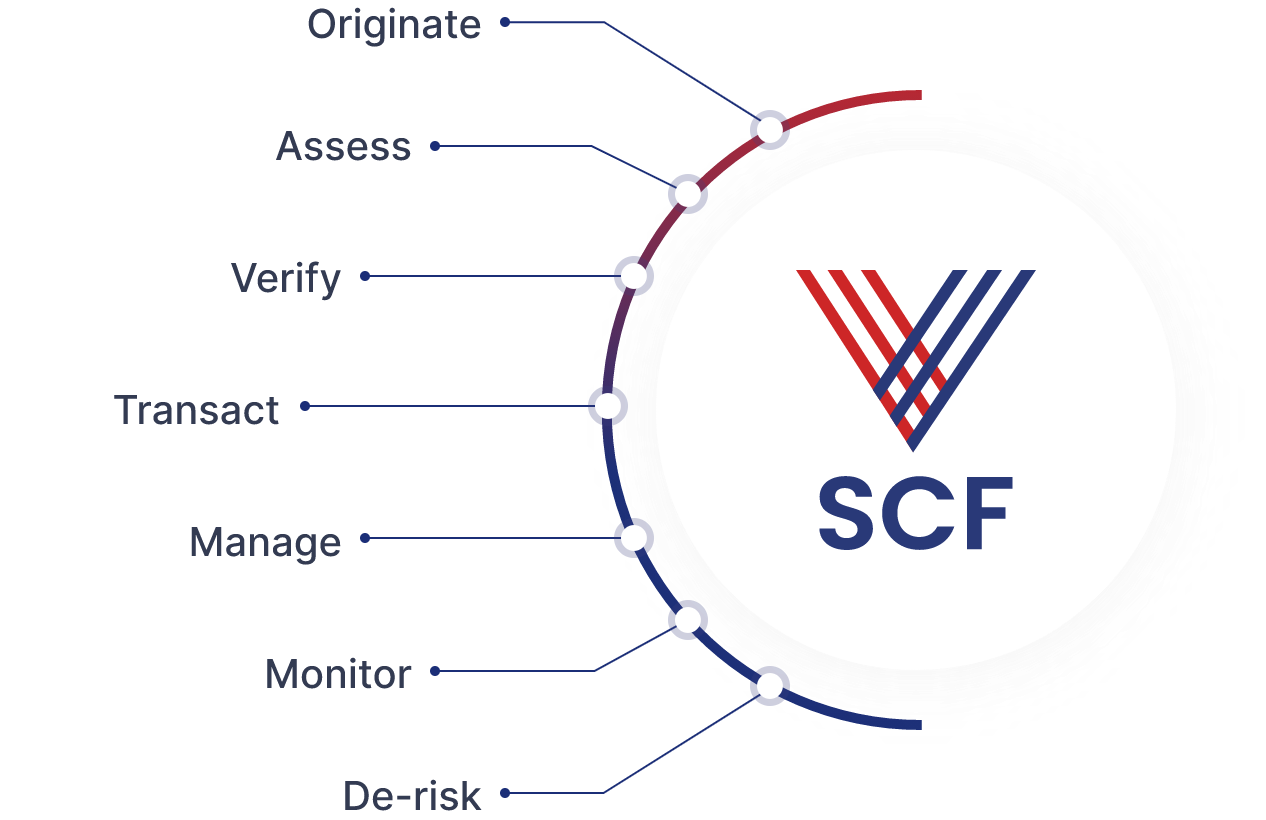Supply Chain Finance Solutions to optimize Working Capital and improve Cashflow.
Supply Chain Finance Solutions to optimize Working Capital and improve Cashflow.
$0Bn+
Financing facilitated
0K+
MSMEs engaged
0+
Supply chains covered
0+
Corporates covered
0+
Cities in India
For Corporates
Discover our Payables and Receivables programs
Single platform for all SCF Programs
Predictable cashflows
20+ major Financial Institutions
Maximum reach and program adoption
For FIs (Financial Institutions)
Discover our comprehensive SCF suite
Cloud-based digital infrastructure
From Loan Origination to Risk Management
Corporate Origination and Network Services
Efficient integration with Corporates
Vayana offers upstream and downstream, anchor-led financing programs for your supply chain.
Payable Financing
A suite of financing programs that enable anchors to make early payments to vendors without impacting their own cash flows, improving supplier liquidity and strengthening relationships.
Vendor Financing
Vendors receive early payments against approved invoices, funded by Financial Institutions, without burdening Anchor Corporate’s balance sheet.
How it Works
Credit limits are established for each supplier.
The anchor reviews and approves supplier invoices.
Vayana facilitates funding through partnered banks and NBFCs.
Suppliers receive early payments at competitive financing rates.
The anchor (buyer) repays the Financial Institution on the invoice due date.
Key Benefits
Strengthens supplier relationships
Zero impact on buyer’s balance sheet
Improves vendor liquidity
Purchase Bill Discounting (PBD) / Payable Financing
Enables anchors to extend their Days Payable Outstanding (DPO) by financing vendor invoices directly, without vendor involvement.
How it Works
Bank/NBFC sets limits based on the anchor’s credit.
Vendor invoices are financed without vendor intervention.
Anchor draws on the credit line to pay early.
Repayment is made as per extended terms.
Key Benefits
Increases DPO
No vendor onboarding required
Reduces procurement bottlenecks
Reverse Factoring
A buyer-initiated program that enables suppliers to receive early payments at lower cost, leveraging the buyer’s credit profile.
How it Works
Buyer approves supplier invoices.
Supplier selects invoices for early payment.
FIs disburses funds to the supplier.
Buyer repays the financier on the due date.
Key Benefits
Immediate liquidity for supplier
Lower interest rates due to buyer risk
Strengthens supply chain reliability
Receivables Financing
Programs that help corporations receive early payments on sales by financing receivables, thus accelerating collections and improving cash flows.
Dealer Financing
An approved credit facility enables dealers to increase purchases, with anchors receiving upfront payments and dealers settling dues at a later date.
How it Works
Credit line is established for dealers
Dealers utilize it to purchase goods from the anchor
Anchor receives upfront payment from the Financial Institution
Dealer repays the Financial Institution as per agreed terms
Key Benefits
Boosts sales and market penetration
Reduces Days Sales Outstanding (DSO)
Improves dealer loyalty and performance
Receivables Financing
Corporates get early payment on sales invoices without taking on debt, using a flexible and selective invoice discounting model.
How it Works
Credit limits are set by the Financial Institution based on the anchor’s profile
Anchor selects approved invoices to be financed under the assigned limit
FI disburses early payment after deducting a discount or fee
Anchor repays the FI on the invoice due date
Key Benefits
No collateral or debt on books
Improves cash flow predictability
Flexible invoice selection
Factoring
Corporates sell their receivables to a financial institution (Factor) to access upfront cash and shift the collection burden – either with or without recourse.
How it Works
Anchor assigns receivables to the Factor
Factor disburses a percentage of the invoice value upfront
Upon collection, the balance is paid to the anchor after deducting fees
Key Benefits
Reduces credit risk
Improves liquidity
Cuts down internal collection efforts
Cross Border Financing
Programs that help corporations receive early payments on sales by financing receivables, thus accelerating collections and improving cash flows.
Cross-Border Financing
Post-Shipment financing for exporters to realize up to 90% of invoice value upfront
How it Works
Exporter ships goods and generates an invoice
Vayana arranges funding from global financial partners
Exporter receives 80–90% of invoice value upfront
Key Benefits
No need for collateral or bank credit line
Supports longer payment terms
Global reach with local onboarding
A suite of financing programs that enable anchors to make early payments to vendors without impacting their own cash flows, improving supplier liquidity and strengthening relationships.
Vendor Financing
Vendors receive early payments against approved invoices, funded by Financial Institutions, without burdening Anchor Corporate’s balance sheet.
How it Works
Credit limits are established for each supplier.
The anchor reviews and approves supplier invoices.
Vayana facilitates funding through partnered banks and NBFCs.
Suppliers receive early payments at competitive financing rates.
The anchor (buyer) repays the Financial Institution on the invoice due date.
Key Benefits
Strengthens supplier relationships
Zero impact on buyer’s balance sheet
Improves vendor liquidity
Payable Financing
Enables anchors to extend their Days Payable Outstanding (DPO) by financing vendor invoices directly, without vendor involvement.
How it Works
Bank/NBFC sets limits based on the anchor’s credit.
Vendor invoices are financed without vendor intervention.
Anchor draws on the credit line to pay early.
Repayment is made as per extended terms.
Key Benefits
Increases DPO
No vendor onboarding required
Reduces procurement bottlenecks
Reverse Factoring
A buyer-initiated program that enables suppliers to receive early payments at lower cost, leveraging the buyer’s credit profile.
How it Works
Buyer approves supplier invoices.
Supplier selects invoices for early payment.
FIs disburses funds to the supplier.
Buyer repays the financier on the due date.
Key Benefits
Immediate liquidity for supplier
Lower interest rates due to buyer risk
Strengthens supply chain reliability
Programs that help corporations receive early payments on sales by financing receivables, thus accelerating collections and improving cash flows.
Dealer Financing
An approved credit facility enables dealers to increase purchases, with anchors receiving upfront payments and dealers settling dues at a later date.
How it Works
Credit line is established for dealers
Dealers utilize it to purchase goods from the anchor
Anchor receives upfront payment from the Financial Institution
Dealer repays the Financial Institution as per agreed terms
Key Benefits
Boosts sales and market penetration
Reduces Days Sales Outstanding (DSO)
Improves dealer loyalty and performance
Receivables Financing
Corporates get early payment on sales invoices without taking on debt, using a flexible and selective invoice discounting model.
How it Works
Credit limits are set by the Financial Institution based on the anchor’s profile
Anchor selects approved invoices to be financed under the assigned limit
FI disburses early payment after deducting a discount or fee
Anchor repays the FI on the invoice due date
Key Benefits
No collateral or debt on books
Improves cash flow predictability
Flexible invoice selection
Factoring
Corporates sell their receivables to a financial institution (Factor) to access upfront cash and shift the collection burden – either with or without recourse.
How it Works
Anchor assigns receivables to the Factor
Factor disburses a percentage of the invoice value upfront
Upon collection, the balance is paid to the anchor after deducting fees
Key Benefits
Reduces credit risk
Improves liquidity
Cuts down internal collection efforts
Programs that help corporations receive early payments on sales by financing receivables, thus accelerating collections and improving cash flows.
Cross-Border Financing
Post-Shipment financing for exporters to realize up to 90% of invoice value upfront
How it Works
Exporter ships goods and generates an invoice
Vayana arranges funding from global financial partners
Exporter receives 80–90% of invoice value upfront
Key Benefits
No need for collateral or bank credit line
Supports longer payment terms
Global reach with local onboarding

Loan Origination System
Streamlined Applications & Flexible Credit Assessment
Swift approvals and loan processing
Instant updates on application status
Secure document and data access
Scalable and growth-ready platform
Transaction Platform
Efficient Financing with Simplified Connectivity
Unified SCF platform
Rapid fund disbursement facilitation for FIs
Standardized data & automated validations
Real-time tracking and audit trail
Limit Management System
Cloud-based Limit Management for Lower Capex
Invoice-level loan tracking
Automates interest calculations
Monitors credit limits in real-time
Provides actionable insights and analytics
How Does Supply Chain Finance Work?
Vayana ensures real-time reconciliation and visibility for all parties across the lifecycle.
Vayana acts as the technology and infrastructure backbone, enabling corporates, their suppliers, and dealers to seamlessly collaborate with financial institutions to optimize working capital, reduce risk, and build stronger, scalable supply chains.
Transaction Initiation (Supplier or Dealer)
Whether it’s a supplier dispatching goods or a dealer placing a purchase order, the transaction starts with a flow of goods and documents (invoice, PO, etc.).
Vayana integrates with the corporate’s ERP to digitize and capture data in real time, whether receivables or payables.
Buyer Approval
Financing Options Rolled Out
Disbursement of Funds
Buyer Makes Final Payment
Vayana ensures real-time reconciliation and visibility for all parties across the lifecycle.
Vayana acts as the technology and infrastructure backbone, enabling corporates, their suppliers, and dealers to seamlessly collaborate with financial institutions to optimize working capital, reduce risk, and build stronger, scalable supply chains.
How can Supply Chain Finance Benefit Corporates or Enterprises?
Supply Chain Finance (SCF) strengthens your cash flow, empowers supplier and dealer relationships, and drives operational efficiency across your value chain.
Benefits for Buyers
Unlock working capital by extending payment terms without straining supplier relationships
Gain better visibility and control over payables
Strengthen supplier reliability and continuity
Improve balance sheet health and liquidity ratios
Reduce supply chain disruption and risk exposure
Benefits for Suppliers
Access early payments on approved invoices without waiting for due dates
Lower financing costs compared to traditional loans
Improve cash flow predictability and working capital efficiency
Build long-term trust and credibility with buyers
Reduce dependence on external credit lines
What partners and clients say
What partners and clients say
Frequently Asked Questions
Supply Chain Finance (SCF) refers to a set of technology-led financing solutions that optimize working capital across the entire supply chain, both upstream (receivables) and downstream (payables). It enables buyers to extend payment terms while giving suppliers access to early payments. On the other side, suppliers can offer early payment terms to their buyers and get financed against their receivables. SCF enhances liquidity, strengthens supplier-buyer relationships, and builds resilient supply chains.
The primary parties in Supply Chain Finance (SCF) include the buyer, supplier, and the financial institution providing the financing. Additionally, fintech enablers like Vayana play a crucial role by providing the technology and infrastructure that connect all parties, streamline processes, and scale the SCF program efficiently.
Vayana plays a pivotal role as the technology enabler and program orchestrator in Supply Chain Finance (SCF).
For FIs, Vayana provide the infrastructure to launch, manage, and scale SCF programs easily, including onboarding, compliance, and end-to-end visibility.
For Corporates and SMEs, we offer a single platform to access a wide range of SCF programs across the entire supply chain, along with automation for invoice uploads, approvals, reconciliation, and real-time tracking.
Suppliers benefit from SCF by gaining quicker access to working capital, reducing the need for expensive short-term financing, and mitigating payment risk. They can also negotiate better terms with buyers.
Buyers can benefit from SCF by optimizing their working capital, improving relationships with suppliers, and potentially negotiating discounts for early payments. It also enhances the overall stability of the supply chain.
SCF is used by businesses of all sizes. Large corporates often implement SCF programs to enhance their supply chains, but the programs can be tailored to meet the needs of smaller enterprises as well.
SCF shares similarities with factoring and invoice discounting, but it’s a broader concept that focuses on optimising the entire supply chain’s financial health. Factoring and invoice discounting primarily involve selling receivables to a third party.
Yes, SCF programs are often tailored to meet the specific requirements of a supply chain. The financing terms and conditions can be adjusted to accommodate the unique dynamics of each supply chain.
To implement SCF, you can start by identifying a partner who understands both your business goals and your supply chain dynamics. Financial institutions and enablers like Vayana can help you set up the right SCF program, be it for payables, receivables, or both.
At Vayana, we make it simple to launch and scale SCF across your ecosystem with program design tailored to your supply chain structure and working capital needs, easy onboarding for corporates and counterparties, and access to a wide network of FIs.
Yes, SMEs benefit significantly from SCF — it ensures they get paid on time, improves liquidity for day-to-day operations, and helps build stronger, more reliable relationships with the large corporates they work with.
Key performance indicators (KPIs) for SCF success include improved days payable outstanding (DPO), days sales outstanding (DSO), and supplier satisfaction. An effective SCF program can also be assessed by its impact on working capital.


